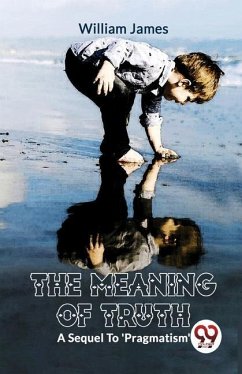'The Meaning of Truth: A Sequel to 'Pragmatism' by William James is a collection of lectures and essays that explore the nature of truth and its role in human experience. Building on the ideas of his earlier work 'Pragmatism, ' James argues that truth is not an abstract or fixed concept, but rather a dynamic process that evolves over time and is shaped by human experience and perspective. The book is divided into five chapters, each of which explores a different aspect of truth, including its relationship to reality, its role in religion and ethics, and its importance in the quest for knowledge. Throughout the book, James draws on a wide range of sources, from philosophy and psychology to literature and history, to illustrate his points and bring his ideas to life. With its engaging style and thought-provoking insights, 'The Meaning of Truth' remains a landmark work in the history of American philosophy







